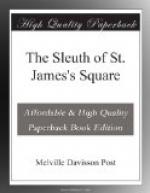“It became necessary to treat with the English Government about the removal of records from Lhassa and I was sent — I was directed to get this packet to you from London. To-night, at dinner with Sir Henry Marquis in St. James’s Square, I learned that you were here. I had then only this hour to come, as my boat leaves in the morning.” He spoke with the extreme care of one putting together a delicate mosaic.
The girl stood staring at the thin packet. A single thought alone consumed her.
“It is a message from — my — father.”
She spoke almost in a whisper.
The big Oriental replied immediately.
“No,” he said, “your father is beyond sight and hearing.”
The girl had no hope; only the will to hope. The reply was confirmation of what she already knew. She removed the thin vellum wrapper from the packet. Within she found a drawing on a plate of ivory. It represented a shaft of some white stone standing on the slight elevation of what seemed to be a barren plateau. And below on the plate, in fine English characters like an engraving, was the legend, “Erected to the memory of Major Judson Carstair by the monastery at the Head.”
The man added a word of explanation.
“The Brotherhood thought that you would wish to know that your father’s body had been recovered, and that it had received Christian burial, as nearly as we were able to interpret the forms. The stone is a sort of granite.”
The girl wished to ask a thousand questions: How did her father meet his death, and where? What did they know? What had they recovered with his body?
The girl spoke impulsively, her words crowding one another. And the Oriental seemed able only to disengage the last query from the others.
“Unfortunately,” he said, “some band of the desert people had passed before our expedition arrived, nothing was recovered but the body. It was not mutilated.”
They had been standing. The girl now indicated the big library chair in which she had been huddled and got another for herself. Then she wished to know what they had learned about her father’s death.
The Oriental sat down. He sat awkwardly, his big body, in a kind of squat posture, the broad Mongolian face emerging, as in a sort of deformity, from the collar of his evening coat. Then he began to speak, with that conscious effect of bringing his words through various mediums from a distance.
“We endeavored to discourage Major Carstair from undertaking this adventure. We were greatly concerned about his safety. The sunken plateau of the Gobi Desert, north of the Shan States, is exceedingly dangerous for an European, not so much on account of murderous attacks from the desert people, for this peril we could prevent; but there is a chill in this sunken plain after sunset that the native people only can resist. No white man has ever crossed the low land of the Gobi.”




